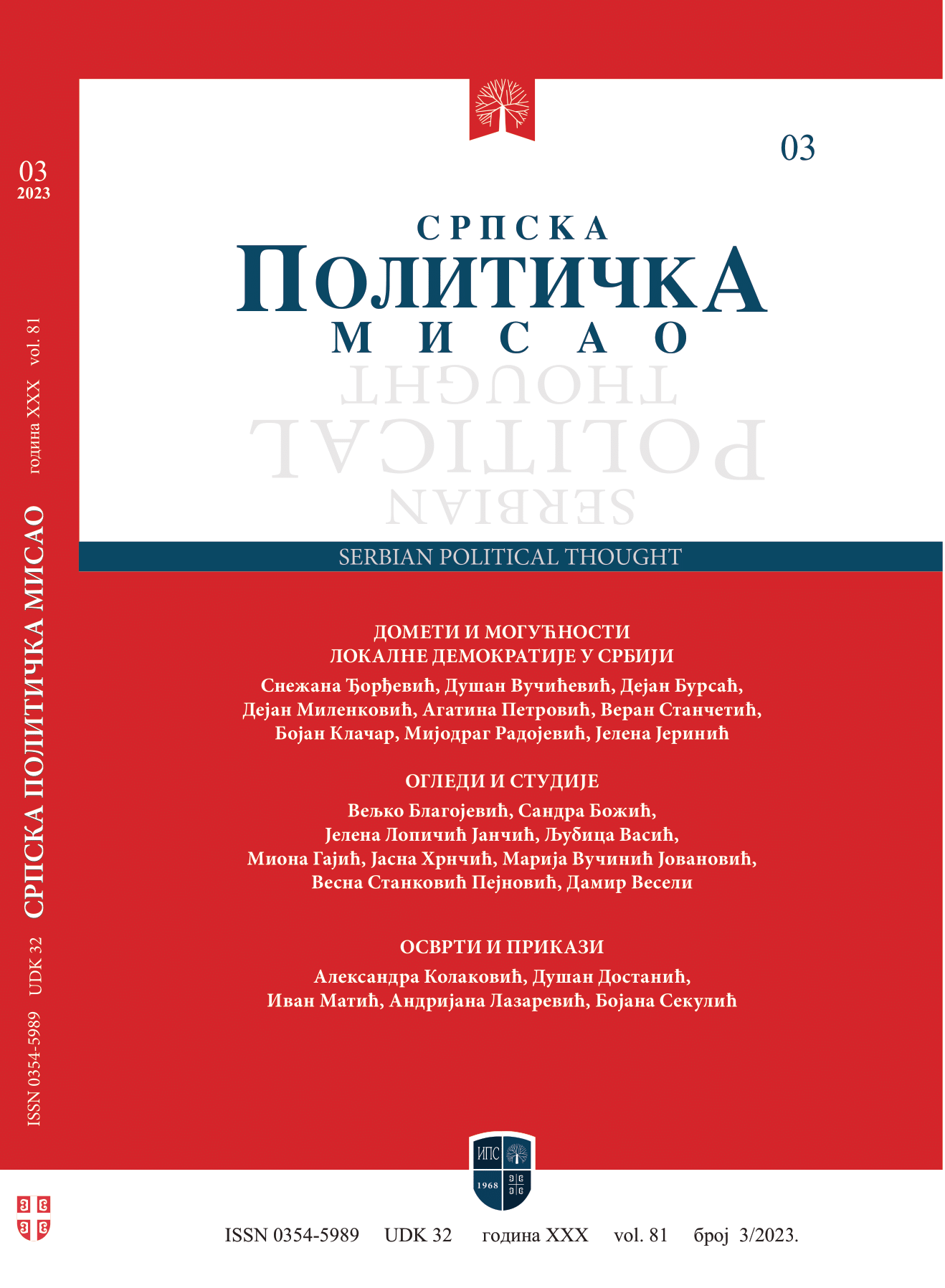WHO SENDS MONEY HOME? FISCAL CONSEQUENCES OF THE TERRITORIAL REPRESENTATION IN SERBIA
Abstract
The practice of political representatives trying to provide benefits to voters in their local communities is not new. The phenomenon is most often operationalized through financing of public works, projects, subsidies, direct transfers or social benefits, provided in order to increase the political ratings and ultimately ensure reelection. Although the practice is more pronounced in candidate-oriented electoral systems consisting of single-member districts, it can also be identified within the countries employing the proportional list system. The authors’ intention is to examine a correlation between the local representation in the Serbian parliament and budgetary transfers and moreover a general level of local financing. For this purpose, data on the residence of MPs was compared with the levels of transfers, subsidies and amount of local expenditures, while the models are additionally controlled with various variables including size of municipality, development level, unemployment rate, share of elderly population, as well as other developmental and societal factors. The sample covered 145 cities and municipalities in Serbia, for а period from 2013 to 2021. The empirical results indicate that pork barrel practices are indeed present even in the environment of closed electoral lists with at-large single district, which does not create institutional incentives for the cultivation of personal vote. But even in Serbia, it seems that local politicians favor their places of residence by increasing the level of public investments. Consequently, municipalities without deputies will remain without financial benefits that parliamentary representation provides. We found that these practices are primarily accomplished through central level subsidies, but can also be identified in the amounts of local budgets and local expenditures. On the other hand, direct annual transfers from the higher levels of government are mostly fixed due to the exact legal criteria, exempting the interference of elected deputies on this particular financing mechanism.
References
Borghetto, E., Santana Pereira, J. & Freire, A. 2020. „Parliamentary Questions as an Instrument for Geographic Representation: The Hard Case of Portugal“. Swiss Political Science Review, 26(1), 10–30.
Вучићевић, Д. и Јовановић, М. 2015. „Реформа изборног система: препреке и перспективе“. Српска политичка мисао – посебно издање, 53-85.
Gorecki, M. A. & Marsh, M. 2012. „Not just ‘friends and neighbours’: canvassing, geographic proximity and voter choice“. European Journal of Political Research, 51 (5), 563-582.
Evans, J., Arzheimer, K., Campbell, R. & Cowley, P. 2017. „Candidate localness and voter choice in the 2015 General Elections in England“. Political Geography, 59, 61-71.
Закон о финансирању локалне самоуправе. 2022. „Службени гласник Републике Србије“ бр. 124/2022.
Klomp, J. & de Haan, J. 2013. „Political Budget Cycles and Election Outcomes“. Public Choice, 157(1–2). 245–267.
Lancaster, T. D. 1986. „Electoral Structures and Pork Barrel Politics“. International Political Science Review, 7(1), 67–81.
Latner, M. & McGann, A. 2005. „Geographical representation under proportional representation: The cases of Israel and the Netherlands“. Electoral Studies, 24(4), 709-734.
Munis, B. K. 2022. „Us Over Here Versus Them Over There... Literally: Measuring Place Resentment in American Politics“. Political Behavior, 44, 1057–1078.
Pedersen, M. J., Kjaer, U. & Eliassen, K. 2004. „Institutions Matter – Even in the Long Run. Representation, Residence Requirements, and Parachutage in Norway and Denmark“. Norwegian Journal of Social Research, 45(2), 335–353.
Pitkin, H. F. 1967. The Concept of Representation. Berkeley: University of California Press.
Републичка изборна комисија. 2023. Последњи приступ 15. 06. 2023. https://www.rik.parlament.gov.rs/
Републички завод за статистику. 2023. Последњи приступ 15. 06. 2023. https://www.stat.gov.rs/
Републички секретаријат за јавне политике. 2023. Последњи приступ 15. 06. 2023. https://rsjp.gov.rs/cir/analiticki-servis/
Rice, T. W. & Macht, A. A. 1987. „Friends and Neighbors Voting in Statewide General Elections“. American Journal of Politcal Science, 31 (2), 448-452.
Stratmann, T. & Baur, M. 2002. „Plurality Rule, Proportional Representation, and the German Bundestag: How Incentives to Pork-Barrel Differ across Electoral Systems“. American Journal of Political Science, 46(3), 506-514.
Studlar D. T. & McAllister, I. 1996. „Constituency Activity and Representational Roles among Australian Legislators“. The Journal of Politics, 58 (1), 69-90.
Shepsle, K. & Weingast, B. 1987. „The Institutional Foundations of Committee Power“. The American Political Science Review, 81(1), 85-104.
Shugart, M. S., Valdini, M. E. & Suominen, K. 2005. „Looking for Locals: Voter Information Demands and Personal Vote‐Earning Attributes of Legislators under Proportional Representation“. American Journal of Political Science, 49 (2), 437-449.
Tavits, M. 2010. „Effect of Local Ties on Electoral Success and Parliamentary Behaviour: The Case of Estonia“. Party Politics, 16 (2), 215-235.
Fiva, J. & Halse, A. 2016. „Local favoritism in at-large proportional representation systems“. Journal of Public Economics, 143(C), 15-26.
Cain, B., Ferejohn, J. & Fiorina, M. 1987. The Personal Vote: Constituency Service and Electoral Independence. Cambridge: Harvard University Press.
Carey, J. M. & Shugart, M. S. 1995. „Incentives to Cultivate a Personal Vote: a Rank Ordering of Electoral Formulas“. Electoral Studies, 14 (4), 417-439.
Carozzi, F. & Repetto, L. 2016. „Sending the pork home: Birth town bias in transfers to Italian municipalities“. Journal of Public Economics, 134, 42-52.
Clarke, H. 1979. „Determinants of provincial service behavior“. Legislative Studies Quarterly, 4, 601-624.
Weingast, B., Shepsle, K. & Johnsen, C. 1981. „The political economy of benefits and costs“. Journal of Political Economy, 89, 642-664.

